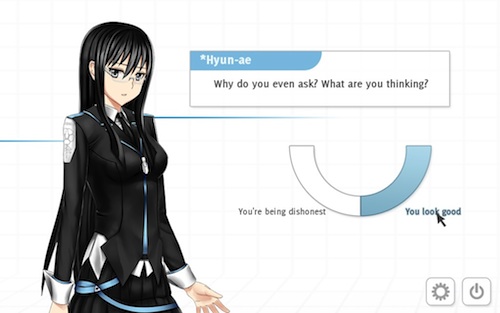IndieCade --the International Festival of Independent Games-- hits downtown Culver City, California this weekend. Here's a look at one of the games that will be there.
If there's one way to start a fight amongst game developers, it's to talk narrative. There are those who think that narrative should serve gameplay. Those who think that story comes first. Those who think that story has nothing whatsoever to do with games.
One look at Analogue: A Hate Story-- heck, one look at the title-- and you know exactly where developer Christine Love stands on the continuum. The game unfolds as a kind of interactive epistolary novel: diary entries and discussions with the on-board Artificial Intelligences ultimately reveal the fate of a starship that has been lost for thousands of years.
The spiritual successor to Love's visual novel Digital: A Love Story, Analogue has elements of the dating sim genre wrapped around a suspenseful tale critics have compared to a horror movie.
We talked with Love about her game, one of the finalists for this year's IndieCade awards.
TURNSTYLE: What does getting into IndieCade mean for you personally? For the project?
Christine Love: It's a huge honor, obviously! I've always been sort of bewildered by the critical response my games have gotten, but this is just a whole new level for me.
TS: What led you to designing a game? What do you bring with your background that another developer might not?
 CL: I think of myself as a writer way before I do as a developer, really. Like most of what I do, Analogue didn't start life as an idea for a game, it started as a story, and then it became apparent that the only way to tell it properly was in an interactive medium. The opposite approach might be more common, but I don't particularly like it; a game's interactive elements should always come after the narrative, or it's not going to be a very good story.
CL: I think of myself as a writer way before I do as a developer, really. Like most of what I do, Analogue didn't start life as an idea for a game, it started as a story, and then it became apparent that the only way to tell it properly was in an interactive medium. The opposite approach might be more common, but I don't particularly like it; a game's interactive elements should always come after the narrative, or it's not going to be a very good story.
TS: Derelict ships and rampant A.I.s are some of the best sci-fi tropes, what were some of your influences while designing the game?
CL: Aside from the game having a very strong mechanical similarity to Portal (the one from the '80s, not the modern one!), I wouldn't say its biggest influences had anything to do with science fiction, really. What Analogue is really based on is a period of Korean history, so what influenced it most was writing from the time, from a princess's memoirs to courtesan poetry. Classical Chinese literature--in particular, Dream of the Red Chamber--also definitely played a pretty big role in the way Analogue tells its story.
TS: What excites you the most about the indie game scene right now?
CL: We're really starting to see a lot of stuff that focuses on doing interesting and new things! I think that could be said for the scene as a whole, but in particular, I'm really excited to see games that take their storytelling seriously, and don't just settle for cinema-wannabe cutscene-filled bullshit.
TS: What are you looking forward to seeing at IndieCade?
CL: Our whole team is from totally different countries, and we were only able to collaborate online; so really, what I think I'm most excited about is just finally being able to meet the people I've worked with for months in person for the first time!
IndieCade, the International Festival of Independent Games starts October 4th with the Red Carpet Awards, and opens to the public on Oct. 6th in Culver City.
Originally published on Turnstylenews.com, a digital information service surfacing emerging stories in news, entertainment, art and culture; powered by award-winning journalists.